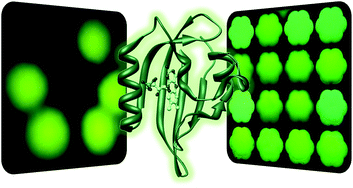The ultimate ambition in cell biology, microbiology and biomedicine is to unravel complex physiological and pathophysiological processes within living organisms. To conquer this challenge, fluorescent proteins (FPs) are used as versatile in vivo reporters and biosensors to study gene regulation as well as the synthesis, localization and function of proteins in living cells. The most widely used FPs are the green fluorescent protein (GFP) and its derivatives and relatives. Their use as in vivo reporter proteins, however, is sometimes restricted by different environmental and cellular factors. Consequently, a whole range of alternative, cofactor-dependent reporter proteins have been developed recently. In this perspective, we summarize the advantages and limitations of the novel class of cyan-green fluorescent flavoproteins in comparison to members of the GFP family and discuss some correlated consequences for the use of FPs as in vivo reporters.
You have access to this article
 Please wait while we load your content...
Something went wrong. Try again?
Please wait while we load your content...
Something went wrong. Try again?


 Please wait while we load your content...
Please wait while we load your content...